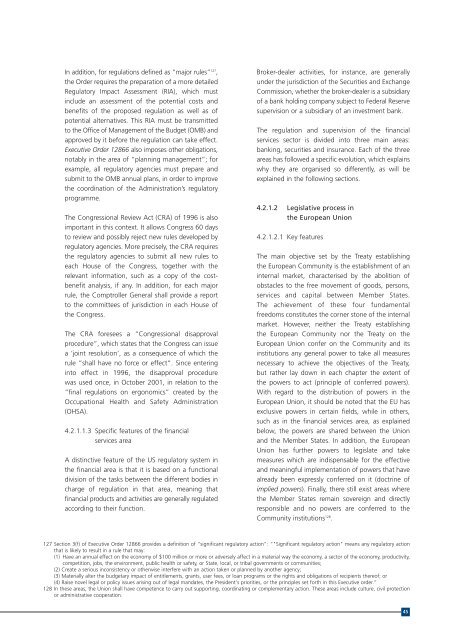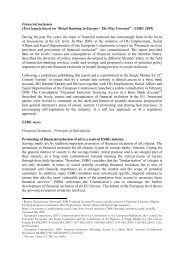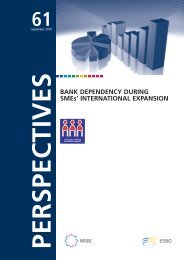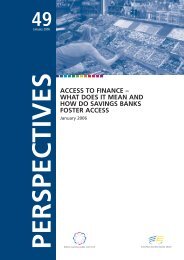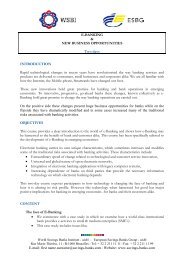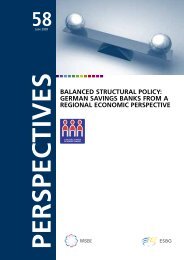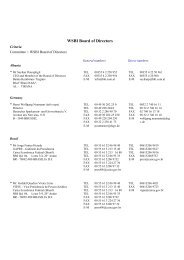A comparative analysis of the US and EU retail banking markets - Wsbi
A comparative analysis of the US and EU retail banking markets - Wsbi
A comparative analysis of the US and EU retail banking markets - Wsbi
You also want an ePaper? Increase the reach of your titles
YUMPU automatically turns print PDFs into web optimized ePapers that Google loves.
In addition, for regulations defined as “major rules” 127 ,<br />
<strong>the</strong> Order requires <strong>the</strong> preparation <strong>of</strong> a more detailed<br />
Regulatory Impact Assessment (RIA), which must<br />
include an assessment <strong>of</strong> <strong>the</strong> potential costs <strong>and</strong><br />
benefits <strong>of</strong> <strong>the</strong> proposed regulation as well as <strong>of</strong><br />
potential alternatives. This RIA must be transmitted<br />
to <strong>the</strong> Office <strong>of</strong> Management <strong>of</strong> <strong>the</strong> Budget (OMB) <strong>and</strong><br />
approved by it before <strong>the</strong> regulation can take effect.<br />
Executive Order 12866 also imposes o<strong>the</strong>r obligations,<br />
notably in <strong>the</strong> area <strong>of</strong> “planning management”; for<br />
example, all regulatory agencies must prepare <strong>and</strong><br />
submit to <strong>the</strong> OMB annual plans, in order to improve<br />
<strong>the</strong> coordination <strong>of</strong> <strong>the</strong> Administration’s regulatory<br />
programme.<br />
The Congressional Review Act (CRA) <strong>of</strong> 1996 is also<br />
important in this context. It allows Congress 60 days<br />
to review <strong>and</strong> possibly reject new rules developed by<br />
regulatory agencies. More precisely, <strong>the</strong> CRA requires<br />
<strong>the</strong> regulatory agencies to submit all new rules to<br />
each House <strong>of</strong> <strong>the</strong> Congress, toge<strong>the</strong>r with <strong>the</strong><br />
relevant information, such as a copy <strong>of</strong> <strong>the</strong> costbenefit<br />
<strong>analysis</strong>, if any. In addition, for each major<br />
rule, <strong>the</strong> Comptroller General shall provide a report<br />
to <strong>the</strong> committees <strong>of</strong> jurisdiction in each House <strong>of</strong><br />
<strong>the</strong> Congress.<br />
The CRA foresees a “Congressional disapproval<br />
procedure”, which states that <strong>the</strong> Congress can issue<br />
a ‘joint resolution’, as a consequence <strong>of</strong> which <strong>the</strong><br />
rule “shall have no force or effect”. Since entering<br />
into effect in 1996, <strong>the</strong> disapproval procedure<br />
was used once, in October 2001, in relation to <strong>the</strong><br />
“final regulations on ergonomics” created by <strong>the</strong><br />
Occupational Health <strong>and</strong> Safety Administration<br />
(OHSA).<br />
4.2.1.1.3 Specific features <strong>of</strong> <strong>the</strong> financial<br />
services area<br />
A distinctive feature <strong>of</strong> <strong>the</strong> <strong>US</strong> regulatory system in<br />
<strong>the</strong> financial area is that it is based on a functional<br />
division <strong>of</strong> <strong>the</strong> tasks between <strong>the</strong> different bodies in<br />
charge <strong>of</strong> regulation in that area, meaning that<br />
financial products <strong>and</strong> activities are generally regulated<br />
according to <strong>the</strong>ir function.<br />
Broker-dealer activities, for instance, are generally<br />
under <strong>the</strong> jurisdiction <strong>of</strong> <strong>the</strong> Securities <strong>and</strong> Exchange<br />
Commission, whe<strong>the</strong>r <strong>the</strong> broker-dealer is a subsidiary<br />
<strong>of</strong> a bank holding company subject to Federal Reserve<br />
supervision or a subsidiary <strong>of</strong> an investment bank.<br />
The regulation <strong>and</strong> supervision <strong>of</strong> <strong>the</strong> financial<br />
services sector is divided into three main areas:<br />
<strong>banking</strong>, securities <strong>and</strong> insurance. Each <strong>of</strong> <strong>the</strong> three<br />
areas has followed a specific evolution, which explains<br />
why <strong>the</strong>y are organised so differently, as will be<br />
explained in <strong>the</strong> following sections.<br />
4.2.1.2 Legislative process in<br />
<strong>the</strong> European Union<br />
4.2.1.2.1 Key features<br />
The main objective set by <strong>the</strong> Treaty establishing<br />
<strong>the</strong> European Community is <strong>the</strong> establishment <strong>of</strong> an<br />
internal market, characterised by <strong>the</strong> abolition <strong>of</strong><br />
obstacles to <strong>the</strong> free movement <strong>of</strong> goods, persons,<br />
services <strong>and</strong> capital between Member States.<br />
The achievement <strong>of</strong> <strong>the</strong>se four fundamental<br />
freedoms constitutes <strong>the</strong> corner stone <strong>of</strong> <strong>the</strong> internal<br />
market. However, nei<strong>the</strong>r <strong>the</strong> Treaty establishing<br />
<strong>the</strong> European Community nor <strong>the</strong> Treaty on <strong>the</strong><br />
European Union confer on <strong>the</strong> Community <strong>and</strong> its<br />
institutions any general power to take all measures<br />
necessary to achieve <strong>the</strong> objectives <strong>of</strong> <strong>the</strong> Treaty,<br />
but ra<strong>the</strong>r lay down in each chapter <strong>the</strong> extent <strong>of</strong><br />
<strong>the</strong> powers to act (principle <strong>of</strong> conferred powers).<br />
With regard to <strong>the</strong> distribution <strong>of</strong> powers in <strong>the</strong><br />
European Union, it should be noted that <strong>the</strong> <strong>EU</strong> has<br />
exclusive powers in certain fields, while in o<strong>the</strong>rs,<br />
such as in <strong>the</strong> financial services area, as explained<br />
below, <strong>the</strong> powers are shared between <strong>the</strong> Union<br />
<strong>and</strong> <strong>the</strong> Member States. In addition, <strong>the</strong> European<br />
Union has fur<strong>the</strong>r powers to legislate <strong>and</strong> take<br />
measures which are indispensable for <strong>the</strong> effective<br />
<strong>and</strong> meaningful implementation <strong>of</strong> powers that have<br />
already been expressly conferred on it (doctrine <strong>of</strong><br />
implied powers). Finally, <strong>the</strong>re still exist areas where<br />
<strong>the</strong> Member States remain sovereign <strong>and</strong> directly<br />
responsible <strong>and</strong> no powers are conferred to <strong>the</strong><br />
Community institutions 128 .<br />
127 Section 3(f) <strong>of</strong> Executive Order 12866 provides a definition <strong>of</strong> “significant regulatory action”: “"Significant regulatory action" means any regulatory action<br />
that is likely to result in a rule that may:<br />
(1) Have an annual effect on <strong>the</strong> economy <strong>of</strong> $100 million or more or adversely affect in a material way <strong>the</strong> economy, a sector <strong>of</strong> <strong>the</strong> economy, productivity,<br />
competition, jobs, <strong>the</strong> environment, public health or safety, or State, local, or tribal governments or communities;<br />
(2) Create a serious inconsistency or o<strong>the</strong>rwise interfere with an action taken or planned by ano<strong>the</strong>r agency;<br />
(3) Materially alter <strong>the</strong> budgetary impact <strong>of</strong> entitlements, grants, user fees, or loan programs or <strong>the</strong> rights <strong>and</strong> obligations <strong>of</strong> recipients <strong>the</strong>re<strong>of</strong>; or<br />
(4) Raise novel legal or policy issues arising out <strong>of</strong> legal m<strong>and</strong>ates, <strong>the</strong> President's priorities, or <strong>the</strong> principles set forth in this Executive order.”<br />
128 In <strong>the</strong>se areas, <strong>the</strong> Union shall have competence to carry out supporting, coordinating or complementary action. These areas include culture, civil protection<br />
or administrative cooperation.<br />
45


